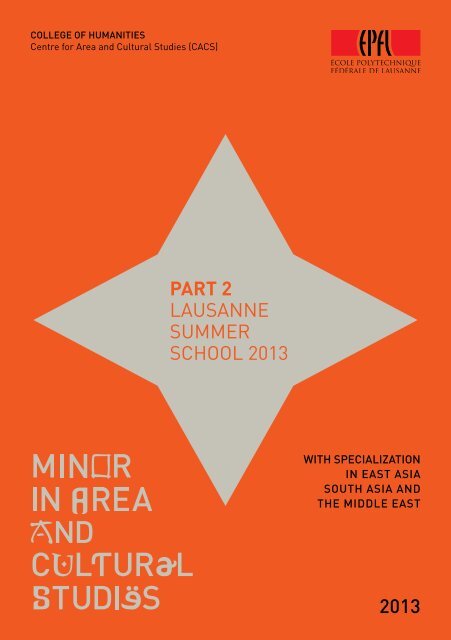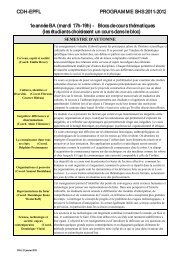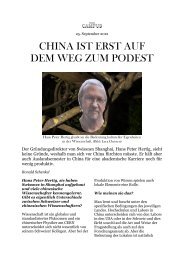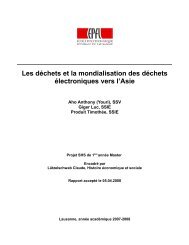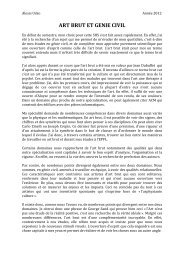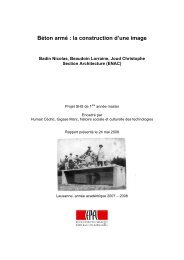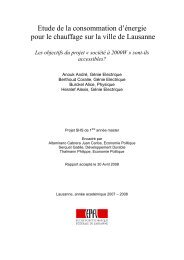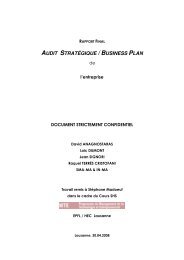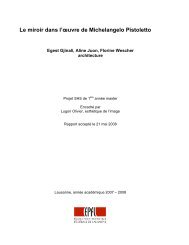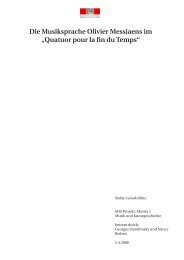here - CDH - EPFL
here - CDH - EPFL
here - CDH - EPFL
You also want an ePaper? Increase the reach of your titles
YUMPU automatically turns print PDFs into web optimized ePapers that Google loves.
COLLEGE OF HUMANITIES<br />
Centre for Area and Cultural Studies (CACS)<br />
PART 2<br />
LAUSANNE<br />
SUMMER<br />
SCHOOL 2013<br />
with Specialization<br />
in East Asia<br />
South Asia and<br />
the Middle East<br />
2013
COLLEGE LAUSANNE OF SUMMER HUMANITIES SCHOOL<br />
Centre for Area and Cultural Studies (CACS)<br />
LAUSANNE<br />
SUMMER SCHOOL<br />
(HUM-481)<br />
CACS <strong>EPFL</strong><br />
Lausanne Summer School held during the last three weeks of July is the<br />
second part of the Minor in Area and Cultural Studies organized by the<br />
Centre for Area and Cultural Studies (CACS). Students will received 8 ETCS.<br />
T<strong>here</strong> are various thematic modules presented over the three weeks. Each<br />
module is under the supervision of an internationally renowned specialist in<br />
the field. The selected topics are designed for <strong>EPFL</strong> students, professionally<br />
and/or personally: they are either related to scientific fields taught at <strong>EPFL</strong><br />
or relevant to the lifestyle of host societies.<br />
SCHEDULE<br />
8 - 26 JULY 2013 / 09:00 - 17:00<br />
CREDITS & REQUIREMENTS<br />
4 ECTS Active participation in class<br />
2 ECTS Readings assessement<br />
2 ECTS Oral or film presentation<br />
EVALUATION<br />
40% Oral or film presentation<br />
40% Reading assignment<br />
20% Participation in class<br />
2
LAUSANNE SUMMER SCHOOL<br />
CACS <strong>EPFL</strong><br />
MODULE I<br />
POLITICS AND POLICIES<br />
CHAIR: Hans Peter Hertig<br />
Coordinator: Christine Lutringer<br />
LECTURERS<br />
Rebecca Karl<br />
East Asian Studies, New York University<br />
Kapil Raj<br />
Ecole des Hautes Etudes en Sciences Sociales, Paris<br />
Hans Peter Hertig<br />
Centre for Area and Cultural Studies, <strong>EPFL</strong> and Weatherhead East-Asian Institute,<br />
Columbia University, New York<br />
Roberto CALDERA<br />
Chair of Cognitive Neuroscience, University of Fribourg<br />
Peter Mollinga<br />
School of Oriental and Africa Studies, London<br />
Nadine Reis<br />
Institute for Social and Development Studies, Munich<br />
Kaushik Basu<br />
World Bank, Washington DC and Department of Economics, Cornell University<br />
3
LAUSANNE SUMMER SCHOOL<br />
CACS <strong>EPFL</strong><br />
PROGRAMME<br />
Monday 8 July<br />
Politics and Ideology<br />
09:00 > 09:15 Welcome and introduction to the programme<br />
Florence Graezer Bideau<br />
09:15 > 09:30 Introduction to module I “Politics and Policies”<br />
Hans Peter Hertig<br />
09:30 >12:30 Politics and ideology: the role of Mao in the making of modern China<br />
Rebecca Karl<br />
This session will explore what “Maoism in practice” was about, from the perspective<br />
of what Chinese socialism was trying to achieve in terms of the theoretical and<br />
practical bases established for an alternative version of modernization from the<br />
capitalist, Euro-American type or the Soviet socialist type. We will read two chapters<br />
of my book on Mao and supplement those with some primary documents from the<br />
Cultural Revolution that took the theories and practices of Maoism to their radical<br />
extremes. Our attempt will be to understand Chinese socialism in its own terms,<br />
rather than to condemn it from the retrospective vantages of its supposed failures.<br />
12:30 >14:00 Lunch with students<br />
14:00 >16:30 Politics and ideology (continued)<br />
Rebecca Karl<br />
16:30 >17:00 Introduction to student presentations<br />
F. Graezer Bideau, C. Lutringer and I. Vogel Chevroulet<br />
Compulsory reading<br />
Karl, R. (2010). “Stabilizing Society and the Transition to Socialism 1949–1957” and “Great Leap and<br />
Restoration 1958–1965”. In Mao Zedong in the Twentieth-Century World, chapters 6 and 7, Durham and<br />
London: Duke University Press, pp. 73-98 and 99-116.<br />
4
LAUSANNE SUMMER SCHOOL<br />
CACS <strong>EPFL</strong><br />
Tuesday 9 July<br />
Science, Technology and Medicines 1<br />
09:00 >12:30 The cultural context of knowledge production<br />
Kapil Raj<br />
Introduction to the different theories of knowledge production (scientism, positivism,<br />
Popper, Kuhn etc); relativism (sociology of knowledge, feminist studies);<br />
knowledge and culture (diffusionism, post colonial studies etc).<br />
12:30 >14:00 Lunch<br />
14:00 >15:00 Asia as a scientific landscape<br />
Hans Peter Hertig<br />
Discussion on the concept of local knowledge; presentation of the CACS research<br />
project.<br />
15:00 >16:30 Local science and expertise:<br />
The Cancer Detectives of Lin Xian<br />
(documentary, UK, 1981, 57 min.)<br />
Kapil Raj and Hans Peter Hertig<br />
Viewing and discussing<br />
17:30 >19:00 Optional movie: The Missing Star / La stella que non c’è<br />
(movie by Gianni Amelio, Italy, 2006, 102 min.)<br />
Compulsory reading<br />
Finlay, R. (2000). “China, the West, and World History in Joseph Needham’s Science and Civilisation in<br />
China”. Journal of World History, vol. 11, n° 2, pp. 265–303.<br />
Sillitoe, P. (2007). “Counting on Local Knowledge”. In Sillitoe P. (ed). Local Science vs Global Science,<br />
Chapter 13, Oxford: Berghahn Books, pp. 257-278.<br />
Optional reading<br />
Raina, D. (2007). “Science since Independence”. In India 60 Towards a New Paradigm, New Delhi: India<br />
International Centre, HarperCollins India and The India Today Group, pp. 182–195.<br />
5
LAUSANNE SUMMER SCHOOL<br />
CACS <strong>EPFL</strong><br />
Wednesday 10 July<br />
Science, Technology and Medicines 2<br />
09:00 >12.30 The encultured brain<br />
Hans Peter Hertig and Roberto Caldera<br />
Discussion of a project on the interrelationship between science and culture recently<br />
launched by CACS. Presentation of research papers relevant for the project.<br />
12:30 >14:00 Lunch<br />
Natural Resources and Environment 1<br />
14:00 >16:30 Water as a politically contested resources:<br />
canal irrigation (reform) in India<br />
Peter Mollinga<br />
Water is a politically contested resource in Asia, as elsew<strong>here</strong>. This introductory<br />
session on the politics of water in post-Independence India will use Ramachandra<br />
Guha’s chapter “The Conquest of Nature” as background material. The session will<br />
address the everyday politics of daily water use, the politics of water policy formulation<br />
and implementation, federal and international hydropolitics, and, finally,<br />
how global politics is relevant to water resources management in India. Discussion<br />
and assignment linked to the video: Tailenders – you have to fight for water rights<br />
(32 minutes). The Tailenders case will be used to discuss the political economy of<br />
unequal water distribution in large scale irrigation, and subsequently of irrigation/<br />
water resources reform.<br />
Compulsory reading<br />
Han, S. and Northoff, G. (2008). “Culture-sensitive neural substrates of human cognition: A transcultural<br />
neuroimaging approach”. Nature Reviews Neuroscience, n°9, pp. 646–654.<br />
Guha, R., (2007). “The Conquest of Nature”. In India after Gandhi, chapter 10, Basingstoke and Oxford:<br />
Macmillan, pp. 209-231.<br />
Optional reading<br />
Blais, C., Jack, R. E., Scheepers, C., Fiset, D., & Caldara, R. (2008). “Culture shapes how we look at<br />
faces”. PLoS ONE, vol. 3, n° 8, e3022.<br />
Jack, R., Garrod, O., Yu, H., Caldara, R., & Schyns, P. G. (2012). “Facial expressions of emotion are not<br />
culturally universal”. Proceedings of the National Academy of Sciences, vol. 109, n° 19, pp. 7241-7244.<br />
Mollinga, P. (forthcoming 2013). “Canal irrigation and the hydrosocial cycle. The morphogenesis of contested<br />
water control in the Tungabhadra Left Bank Canal, South India”. Geoforum. (The Special issue<br />
will appear in October http://www.water-alternatives.org/index.php?option=com_content&task=view&id=19&Itemid=27).<br />
6
LAUSANNE SUMMER SCHOOL<br />
CACS <strong>EPFL</strong><br />
Wade, R. (1982). “The system of administrative and political corruption: Canal irrigation in South India”.<br />
The Journal of Development Studies, vol. 18, n° 3, pp. 287–328.<br />
Suhardiman, D. and Mollinga, P. (2012). “Correlations, causes and the logic of obscuration: Donor shaping<br />
of dominant narratives in Indonesia’s irrigation development”. The Journal of Development Studies,<br />
vol. 48, n° 7, pp. 923-938.<br />
Thursday 11 July<br />
Natural Resources and Environment 2<br />
09:00 >12:00 Rural water supply and sanitation in the Mekong delta, Vietnam:<br />
global goals, national policy and local practice<br />
Nadine Reis<br />
Brief sketch of water supply and sanitation problems in the Mekong region as an<br />
example of the “global water crisis”. Discussion of the global governance response<br />
to that crisis – the Millennium Development Goals for water supply and sanitation.<br />
National policy and the “aid game”: outcomes, processes, and business for bureaucrats;<br />
Discussion of the logic of development assistance in the water supply and<br />
sanitation sector – for donors, for national governments and for local bureaucrats.<br />
Ground realities of rural water supply and sanitation (RWSS) in the Mekong delta:<br />
Discussion of practices of water supply infrastructure creation and micro-credits<br />
schemes for RWSS.<br />
12:00 >13:00 Lunch<br />
13:00 >15:00 Questions and Answers<br />
Peter Mollinga and Nadine Reis<br />
Formulation and discussion of general insights from the two presentations<br />
15:00 >17:00 Follow-up on student presentations: selection of topics and working<br />
in groups with tutors<br />
F. Graezer Bideau, C. Lutringer and I. Vogel Chevroulet<br />
18:00 >19:30 Optional movie: 3 Idiots<br />
(movie by Rajkumar Hirani, India, 2009, 111 min.)<br />
Compulsory reading<br />
Reis, N. and Mollinga, P. (2012).” Water Supply or ‘Beautiful Latrines’? Microcredit for Rural Water Supply<br />
and Sanitation in the Mekong Delta, Vietnam”. ASEAS – Austrian Journal of South-East Asian Studies,<br />
vol. 5, n° 1, pp. 10-29.<br />
7
LAUSANNE SUMMER SCHOOL<br />
CACS <strong>EPFL</strong><br />
Optional reading<br />
Reis, N. (2012). “Global policy ideas: the operation on the image of the state”. In Tracing and making the<br />
state: Policy practices and domestic water supply in the Mekong Delta, Vietnam, Chapter 5, Berlin: LIT,<br />
pp. 165-194.<br />
Bakker, K., Kooy M., Nur Endah S. and Martijn, E-J. (2008). “Governance Failure: Rethinking the Institutional<br />
Dimensions of Urban Water Supply to Poor Households”. World Development, vol. 36, n° 10, pp.<br />
1891–1915.<br />
Special Issue (forthcoming 2013). In Water Alternatives on “Trends and Developments in Rural Water<br />
Supply Services Delivery”.<br />
FRIDAY 12 JULY<br />
Politics and social foundations of economic development<br />
09:00 >12.30 India after Independence<br />
Kaushik Basu<br />
An initial session will be devoted to understanding the social, political and cultural<br />
embeddedness of the Indian economy, paying special attention to the political<br />
constraints within which India operates and the strengths and weaknesses of this<br />
mooring. Contemporary India faces the challenge of trying to achieve high growth<br />
with social justice – inclusive growth, as the present government calls it. What are<br />
the policy instruments available for these objectives and what are the prospects<br />
of the Indian economy? The lectures will give a quick history and then focus on<br />
contemporary times, including the story of India’s globalization and handling of the<br />
Eurozone crisis.<br />
12:30 >14:00 Lunch<br />
14:00 >15:00 India after Independence (continued)<br />
Kaushik Basu<br />
15:00 >16:00 Wrap up<br />
16:00 >17:00 Evaluation module I<br />
Compulsory reading<br />
Basu K., (2004). “The Indian economy up to 1991 and since”. In K. Basu (ed). India’s Emerging Economy:<br />
Performance and Prospects, Chapter 1, Cambridge, Mass.: The MIT Press, pp. 3-32.<br />
8
LAUSANNE SUMMER SCHOOL<br />
CACS <strong>EPFL</strong><br />
MODULE II<br />
CIVIL SOCIETY AND SOCIAL<br />
CHANGE IN RISING CHINA<br />
CHAIR: Chua Beng Huat<br />
Coordinator: Florence Graezer Bideau<br />
LECTURERS<br />
Alaka Basu<br />
Department of Development Sociology, Cornell University<br />
Chua Beng Huat<br />
Asia Research Institute and Department of Sociology, National University of Singapore<br />
Florence Graezer Bideau<br />
Centre for Area and Cultural Studies, <strong>EPFL</strong><br />
Daniel Goh<br />
Department of Sociology, National University of Singapore<br />
9
LAUSANNE SUMMER SCHOOL<br />
CACS <strong>EPFL</strong><br />
PROGRAMME<br />
Monday 15 July<br />
Social change across Asia<br />
09:00 > 09:15 Welcome, introduction to programme of module II<br />
Chua Beng Huat<br />
09:15 >10:45 Rising Asia: Southeast Asia, China and India<br />
Chua Beng Huat<br />
Since the mid 1960s, different regions of Asia have successively and successfully<br />
adopted the development strategy of “export-oriented” industrialization, with<br />
strong administrative and financial guidance from the state. Chronologically, the<br />
rise of Asia began with the four “Tiger/Dragon” economies of South Korea, Taiwan,<br />
Hong Kong and Singapore, followed by the marketization of the Chinese economy in<br />
the and the second wave of industrialization in Southeast Asia, including communist<br />
Vietnam. India also began to open up to the global market in the late 1990s. By the<br />
2000s, the rise of Asia was indubitable and Asia has become a critical element in<br />
global economic stability.<br />
11:00 >13:00 Society and social change in India<br />
Alaka Basu<br />
While the focus of this class will be on India, we will also turn often to the South<br />
Asian region as a whole, both to demonstrate commonalities as well as to specify<br />
some unique features of the Indian experience. The background reading contains<br />
recent social “facts” about the situation in India. These facts will provide the peg<br />
around which we will talk about the theoretical and empirical perspectives that<br />
seek to understand the question of society and social change in India. While we will<br />
focus in particular on social inequality by various measures – gender, caste, class,<br />
religion – the aim of the class is not just to demonstrate and explain the disadvantages<br />
faced by these different kinds of groups in Indian society. We will spend more<br />
time looking at the changes that have occurred over time (and while many of these<br />
changes have been positive, t<strong>here</strong> have been some important negative ones as<br />
well), the possible reasons for these changes and, in particular, the role of policy in<br />
creating greater equality. I am particularly interested in recent efforts to empower<br />
disadvantaged groups through education, legal changes and economic productivity<br />
and to evaluate the impacts of such efforts.<br />
13:00 >14:00 Lunch<br />
14:00 >16:30 Society and social change in India (continued)<br />
Alaka Basu<br />
10
LAUSANNE SUMMER SCHOOL<br />
CACS <strong>EPFL</strong><br />
16:30 >17:00 Summary and discussion<br />
18:00 >19:30 Optional movie: English Vinglish<br />
(movie by Gauri Shinde, India, 2012, 73 min.)<br />
Compulsory reading<br />
World Bank, (2011). “Overview”. In Poverty and Social Exclusion in India, Washington DC: World Bank.<br />
Mahbubani, K. (2008). “Why is Asia Rising Now”, in The New Asian Hemisp<strong>here</strong>. The Irresistible Shift of<br />
Global Power to the East. New York: Public Affairs, pp.51-99.<br />
Tuesday 16 July<br />
Culture and Democracy in Asia<br />
09:00 >12:30 Asian Resistance to Liberalism<br />
Chua Beng Huat<br />
American economic and military expansions globally have been accompanied by<br />
its ideological leadership, championing a version of liberal democracy which emphasizes<br />
liberal individualism over any social conception of politics and economy,<br />
including social democracy. However, liberalism has no roots in the post-war,<br />
post-colonial nations in Asia. With its highly successful capitalist development, the<br />
single-party dominant state of Singapore has resisted liberalism and reinterpreted<br />
the democratic concepts of representation and trusteeship to emphasize the social<br />
over the individual, backed up by social policies that emphasizes collective well<br />
being and group rights. This has provoked other Asian nations, particularly China,<br />
to “learn” from Singapore.<br />
12:30 >14:00 Lunch<br />
14:00 >16:30 Religion, state and political society<br />
Daniel Goh<br />
Unlike Western societies, religion does not occupy clearly defined institutional<br />
positions in civil society or the public sp<strong>here</strong> in Asia. Across Asia, religion is found<br />
playing both transparent and opaque roles in politics. Some religions are closely<br />
identified with the state, even in ostensibly secular states, and play a big part in<br />
political discourse and policy making. In some countries, religion plays a central<br />
institutional role in legitimating the state, while some states co-opt and control religions<br />
they believe pose challenges to their rule. In all these societies, religion plays<br />
a crucial role in mobilizing communities and local political action that would render<br />
state and society relations unstable and fluid. Political society, as a space distinct<br />
from the state and civil society, is theorized to understand this politics.<br />
16:30 >17:00 Summary and discussion<br />
11
LAUSANNE SUMMER SCHOOL<br />
CACS <strong>EPFL</strong><br />
Compulsory reading<br />
Chua, Beng Huat. (2010). “Disrupting hegemonic liberalism in East Asia”, Boundary 2, vol. 37, n° 2, pp. 199 - 216.<br />
Chatterjee, P. (2007). “Democracy and the Violence of the State: A Political Negotiation of Death”.<br />
In Kuan-Hsing Chen and Chua Beng-Huat (eds), Inter-Asia Cultural Studies Reader, chapter 6, London:<br />
Routledge, pp. 163-177.<br />
Optional reading<br />
Wang, Hui. (2011). “The Politics of Imagining Asia”. In Wang Hui, The Politics of Imagining Asia, Chapter 1.<br />
Cambridge, Mass: Harvard University Press, pp. 10-62.<br />
Fealy, G. and McGregor K. (2010). “Nahdlatul Ulama and the Killings of 1965-66: Religion, Politics, and<br />
Remembrance”, Indonesia, no. 89, pp. 37-60.<br />
Wednesday 17 July<br />
Heritage, Conservation and Civil Society<br />
09:00 >12:30 Cultural heritage discourses and contestations in China<br />
Florence Graezer Bideau<br />
What is at stake in the conservation of the past in Asia? Urban heritage will be<br />
considered to discuss different strategies in the conservation contests between<br />
state authorities and civil society. Focusing on case studies in China, Malaysia and<br />
Singapore, this session is designed to highlight the empowerment of social groups<br />
engaged in processes of tangible and intangible cultural heritage taking place in<br />
different historical and political contexts. By comparing the local practices and discourses<br />
of these mobilized communities, we will explore how and why civic actions<br />
challenge national heritage policies not only as a competition for space and identity,<br />
but also as a result of desire for the global.<br />
12.30 >14:00 Lunch<br />
14:00 >16:30 Heritage politics in Singapore, Penang and Hong Kong<br />
Daniel Goh<br />
16:30 >17:00 Discussion<br />
18:00 >19:30 Optional movie Flowers of Shanghai / Hai shang hua<br />
(movie by Hou Hsiao Hsien, Taiwan, 1998, 70 min.)<br />
Compulsory reading<br />
Nagata, J. (2010). “’Elasticity’ of Heritage from Conservation to Human Rights: A Saga of Development<br />
and Resistance in Penang, Malaysia”. In Langfield M. et al (eds), Cultural Diversity, Heritage and Human<br />
Rights: Intersections in Theory and Practice, chapter 7, London: Routledge, pp. 101-116.<br />
12
LAUSANNE SUMMER SCHOOL<br />
CACS <strong>EPFL</strong><br />
Optional reading<br />
Graezer Bideau, F. and Kilani M. (2012). “Multiculturalism, cosmopolitanism and making heritage in<br />
Malaysia. A view from the historic cities of the Straits of Malacca”, International Journal of Heritage<br />
Studies, Vol. 18, n° 6, pp. 605-623.<br />
Ku, A. (2012). “Remaking places and fashioning an opposition discourse: struggle over the Star Ferry<br />
pier and the Queen’s pier in Hong Kong,” Environment and Planning D: Society and Space, vol. 30, no.1,<br />
pp. 5-22.<br />
Thursday 18 July<br />
Multiculturalism<br />
09:00 >12:30 Multiculturalism in Southeast Asia<br />
Chua Beng Huat<br />
As postcolonial countries, all Southeast Asian countries are multi-ethnic or multiracial<br />
at the point of independence from colonial regimes. Furthermore, race is<br />
often closely linked to religion, for example, Indians and Hinduism. Such post<br />
colonial countries are thus states which contain many ethno-nations and in constant<br />
threat of fragmentation along racial or ethnic lines. This contrasts with the<br />
European conception of the nation-state which presumes an ethnically and linguistically<br />
homogeneous population. The new nations have been compelled to develop<br />
different strategies in the management of race and religion, developed under different<br />
models of “multiculturalism”. This lecture will discuss the different strategies<br />
adopted in Singapore, Malaysia and Indonesia.<br />
12:30 >13:30 Lunch break<br />
13:30 >15:00 Student presentations (first round)<br />
15:00 >17:00 12 Storeys<br />
(movie by Eric Khoo, Singapore, 1997, 105 min.)<br />
Viewing and discussing<br />
18:00 >19:30 Optional movie: Paan Singh Tomar<br />
(movie by Tigmanshu Dhukia, India, 2010, 75 min.)<br />
Compulsory reading<br />
Kymlicka, W. and He B. (2005). “Liberal Multiculturalism: Western Models, Global Trends, and Asian<br />
Debates”. In Multiculturalism in Asia, Chapter 2, Oxford: Oxford University Press, pp. 22-55.<br />
Optional reading<br />
Chua, Beng Huat. (2007). “Political Culturalism, Representation and the People’s Action Party of<br />
Singapore”, Democratization, vol. 14, n° 5, pp. 911-927.<br />
13
LAUSANNE SUMMER SCHOOL<br />
CACS <strong>EPFL</strong><br />
FRIDAY 19 JULY<br />
CONSUMPTION<br />
09:00 >12:30 Street food in Asia – Visual presentation<br />
CHUA Beng Huat<br />
Street food is often marketed as a tourist attraction in Asian countries, from developed<br />
Japan and Korea to developing Indonesia and Vietnam. Significantly, it is also<br />
an important economic institution that contributes to the global competitiveness of<br />
particularly emerging economies; inexpensive street food dampens wage demands,<br />
thus indirectly subsidizes production costs of capitalists. With sustained economic<br />
growth, rising education and income and rising expectations, the street food sector<br />
is facing mounting difficulties in recruiting individuals who are willing to take the<br />
arduous life of a street food vendor. The case of Singapore is illustrative of the<br />
instability and future sustainability of this important economic sector to both the<br />
daily life of the local citizens and national competitiveness of the emerging economies<br />
in Asia.<br />
12:30 >14:00 Lunch<br />
14:00 >16:00 Group presentations (second round)<br />
16:00 >17:00 Wrap up and evaluation module II<br />
14
LAUSANNE SUMMER SCHOOL<br />
CACS <strong>EPFL</strong><br />
MODULE III<br />
VISIONS, SOUNDS AND MEMORIES -<br />
POPULAR CULTURE IN EAST<br />
AND SOUTH ASIA<br />
CHAIR: Jeroen de Kloet<br />
Coordinator: Irène VOGEL CHEVROULET<br />
LECTURERS<br />
Jeroen de Kloet<br />
Globalisation Studies, University of Amsterdam<br />
Ian Condry<br />
Comparative Media Studies, MIT<br />
Chow Yiu Fai<br />
Humanities Program, Hong Kong Baptist University<br />
Andrea Riemenschnitter<br />
Institute of East Asian Studies, University of Zurich<br />
Gopalan Balachandran<br />
Graduate Institute of International and Development Studies, Geneva<br />
15
LAUSANNE SUMMER SCHOOL<br />
CACS <strong>EPFL</strong><br />
PROGRAMME<br />
Monday 22 July<br />
Globalization and Youth<br />
09:00 >09:30 Introduction to module III<br />
Jeroen de Kloet<br />
09:30 >11:00 Asia in a globalized world<br />
Jeroen de Kloet<br />
How does globalization affect Asian culture and how does Asian culture affect<br />
globalization? This opening lecture will engage with the emergence of Asian pop<br />
culture in the context of current debates on globalization.<br />
11:00 >13:00 Japanese Anime<br />
Ian Condry<br />
Introduction to anime, youth cultures and popular culture in Japan. What does it<br />
mean to be young in Japan, and how are subcultural styles emerging in Japan, what<br />
role does music play? What anime cultures have been developed, how do they blur<br />
the lines between producer, text and consumer and how can an anthropological approach<br />
help us understand them?<br />
13:00 >14:30 Lunch<br />
14:30 >17:00 Summer Scent (TV drama by Yoon Seok-ho, Korea, 2003)<br />
Viewing and discussing assignment<br />
18:00 >19:30 Optional movie: Last train Home<br />
(movie by Fan Lixin, China, 2009, 85 min.)<br />
Compulsory reading<br />
Chua, Beng Huat. (2004). “Conceptualizing an East-Asian popular culture”. Inter-Asia Cultural Studies<br />
5, n° 2, pp. 200–221.<br />
Optional reading<br />
Appadurai, A. (1996). “Disjuncture and Difference in the Global Culutral Economy” in Modernity At Large<br />
- Cultural Dimensions of Globalization, Chapter 2, Minneapolis: University of Minnesota Press, pp. 27-47.<br />
de Kloet, J. (2010). “Introduction: Global longings with a Cut” in China with a Cut – Globalisation, Urban<br />
Youth and Popular Music, Amsterdam: Amsterdam University Press, pp. 1-36.<br />
16
LAUSANNE SUMMER SCHOOL<br />
CACS <strong>EPFL</strong><br />
Tuesday 23 July<br />
Cool Culture and Creativity<br />
09:00 >11:00 Cool Japan<br />
Ian Condry<br />
Hatsune Miku, Japan’s virtual idol, attracts audiences worldwide. What does this<br />
say about the future of media, capitalism, and political participation? This case is<br />
framed within the context of the creative industries in Japan, such as anime culture<br />
production, popular music, and fashion… How do fans participate in the production<br />
of culture? How are Japanese creativities supported, and what role does technology<br />
play?<br />
11:00 >13:00 Creative Hong Kong<br />
Chow Yiu Fai<br />
How does Hong Kong culture survive after the handover from British to Chinese<br />
rule in July 1997? What role could it play, and how can we study the production of<br />
culture in Asian cities like Hong Kong? What does Hong Kong tell us about postcolonial<br />
theory, and vice versa?<br />
13:00 >14:00 Lunch with students<br />
14:00 >17:00 Kamikaze Girls<br />
(movie by Tetsuya Nakashima, Japan, 2004, 102 min.)<br />
Viewing and discussing<br />
Compulsory reading<br />
Condry, I. (2013). “Introduction: Who makes anime?” in The Soul of Anime: Collaborative Creativity and<br />
Japan’s Media Success Story, Durham, NC: Duke University Press, pp. 1-34.<br />
Optional reading<br />
Chu, S. Yiu-wai. (2011). “Brand Hong Kong: Asia’s World City as Method?” Visual Anthropology, vol. 24,<br />
n°1-2, pp. 46–58.<br />
Yano, C.R. (2013) “Introduction: Kitty – Japan – Global”. In Pink Globalization: Hello Kitty’s Trek Across<br />
the Pacific, Durham and London: Duke University Press, pp 1-42.<br />
17
LAUSANNE SUMMER SCHOOL<br />
CACS <strong>EPFL</strong><br />
Wednesday 24 July<br />
Memory and Forgetting<br />
09:00 >13:00 Memory and culture<br />
Andrea Riemenschnitter<br />
Navigating between national memory-places, which are encoded as the location of<br />
a community’s political sublime, and the current revaluation of grass-roots’ place<br />
attachment, which defies this ideological encryption, we will explore the cultural<br />
semiotics of places in the PR China. How is China’s cultural production responding<br />
to the assault on the collective forms of memory by first, history, and second, economic<br />
development and the wholesale commodification of the planet? How do we<br />
bridge the gap between globalized cultural consumption and cultural encodings of<br />
the local, including the impact of the global on particular groups and locations? How<br />
is the growing urban-rural divide reflected in the cultural production?<br />
13:00 >14:00 Lunch<br />
14:00 >16:00 Emerging creativities in urban China<br />
Jeroen de Kloet and Andrea Riemenschnitter<br />
How has the discourse of the creative industries travelled to China, with which implication<br />
for cultural production, for the possibility of being critical, and how has<br />
this affected the city? What different creativities are currently emerging, with which<br />
socio-cultural and political implications. Is t<strong>here</strong> any space left for criticality? And<br />
how are these emerging creativities implicated in the global cultural industries,<br />
such as an art world that consists of multiple biennales, and auctions in places like<br />
Hong Kong and Paris?<br />
17:00 >18:30 Optional movie: Fear and Trembling / Stupeurs et Tremblements<br />
(movie by Alain Corneau, France, 2003, 107 min.)<br />
Compulsory reading<br />
Lee, Haiyan. (2012). “The Ruins of Yuanmingyuan: or, How to Enjoy a National Wound”. In Matten M.A.<br />
(ed), Places of Memory in Modern China. History, Politics, and Identity, Chapter 7, Leiden: Brill, pp.<br />
193-229.<br />
Optional reading<br />
Liu, Xinmin. (2009). “In the Face of Developmental Ruins: Place Attachment and Its Ethical Claims”. In<br />
Sheldon, H. Lu and Jiayan Mi (eds), Chinese Ecocinema in the Age of Environmental Challenge, Chapitre<br />
11, Hong Kong: Hong Kong University Press Scholarship, pp. 217-248.<br />
Kong, L., Gibson C., Khoo L.-M., and Semple A.L. (2006). “Knowledges of the Creative Economy: Towards a<br />
Relational Geography of Diffusion and Adaptation in Asia.” Asian Pacific Viewpoint, vol. 47, n° 2, pp. 173-94.<br />
18
LAUSANNE SUMMER SCHOOL<br />
CACS <strong>EPFL</strong><br />
Thursday 25 July<br />
Cricket and Cinema<br />
09:00 >13:00 Cinema, cricket, and popular culture in contemporary India<br />
gopalan Balachandran<br />
These sessions explore the place of cinema in the popular imaginations of modern<br />
and contemporary India. How did popular cinema express and shape the hopes,<br />
longings, disappointments, and anger of a post-colonial nation? It is a popular<br />
cliché that only cinema and cricket keep India together. How did cricket come to<br />
occupy the role it did in modern India? How do cricket and cinema come together,<br />
and with what results? The readings are merely a starting point for reflections on<br />
cinema and cricket as sites for interventions seeking to express, shape, and perhaps<br />
appropriate the hopes and dreams that a billion people project on their stars<br />
and their work.<br />
13:00 >14:00 Lunch<br />
14:00 >17:00 Cinema, cricket, and popular culture in contemporary India<br />
(continued)<br />
Gopalan Balachandran<br />
Compulsory reading<br />
Vasudevan, R. (2010). “The Contemporary Film Industry – I: The Meanings of ‘Bollywood’” in The Melodramatic<br />
Public: Film Form and Spectatorship in Indian Cinema, London: Palgrave Macmillan, pp. 334-361.<br />
Optional reading<br />
Vasudevan, R. (2010). “The Contemporary Film Industry – II: Textual Form, Genre Diversity, and Industrial<br />
Strategies” in The Melodramatic Public: Film Form and Spectatorship in Indian Cinema, London:<br />
Palgrave Macmillan, pp. 362-397.<br />
Nandy, A. (2007). “The Wistful Camel and the Eye of the Needle” and “Victory, Defeat and the Future of<br />
the Savage” in The Tao of Cricket: On Games of Destiny and Destiny of Games, chapters 2 and 3, Delhi:<br />
Oxford University Press, pp. 52-89 and 90-122.<br />
19
LAUSANNE SUMMER SCHOOL<br />
CACS <strong>EPFL</strong><br />
Friday 26 July<br />
Cities and Digital Culture<br />
09:00 >10:30 The fringes of the Asian City<br />
Chow Yiu Fai and Jeroen de Kloet<br />
In this lecture we start with general theories on life in the postmetropolis. We wonder,<br />
what does Lindner exactly mean when he writes about the blasé postmetropolitan<br />
attitude, and can we also trace such an attitude when living in a city like<br />
Lausanne? How does cinema help us grasp living in the city? And what about the<br />
fringes of the city, in particular: why are rooftops playing such an important role in<br />
movies? What do they signify? We will in particular look at rooftop scenes in three<br />
movies from Hong Kong: Infernal Affairs, High Noon and Inner Senses.<br />
11:00 >13:00 Digital culture in Asia<br />
Jeroen de Kloet<br />
The Chinese version of Twitter – Weibo – allows citizens to discuss all sorts of topics<br />
online, often before the censors can stop them. Will the Internet facilitate political<br />
change, or will it increase surveillance? How do new technologies change the<br />
mediascape of Asia? Are we all becoming cultural producers with the use of new<br />
technologies? If technology allows, in this session we will experiment live with Weibo<br />
and communicate with Chinese Weibo users…<br />
13:00 >14:00 Lunch<br />
14:00 >16:00 Student presentations (third round)<br />
16:00 >17:00 Wrap up and evaluation module III and Lausanne Summer School<br />
Compulsory reading<br />
Chow, Yiu Fai and de Kloet, J. (2013). “Flanerie and acrophilia in the postmetropolis: Rooftops in Hong<br />
Kong cinema”. Journal of Chinese Cinemas, vol. 2, n° 2, pp. 139-155.<br />
Optional reading<br />
Abbas, A. (2000). “Cosmopolitan De-scriptions: Shanghai and Hong Kong”, Public Culture, vol. 12, n° 3,<br />
pp. 769-86.<br />
20
graphisme: janka rahm - atelier huit
CONTACT DETAILS<br />
For further information please contact:<br />
Dr Florence Graezer Bideau, Acting Director<br />
Administration:<br />
Catherine CHAPERON<br />
<strong>EPFL</strong> – <strong>CDH</strong> – CACS<br />
CM 2 267<br />
Station 10<br />
CH-1015 Lausanne (Switzerland)<br />
T : +41 21 693 02 39<br />
E : catherine.chaperon@epfl.ch<br />
Or visit our website : https://cdh.epfl.ch/cacs


